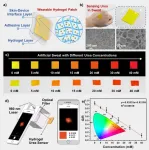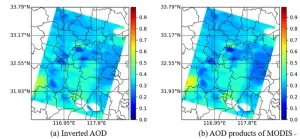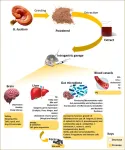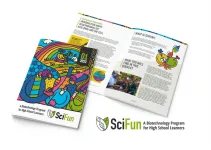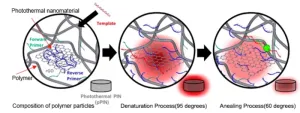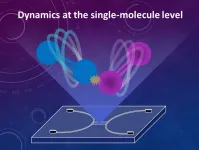(Press-News.org) Aquaculture, or the farming of aquatic plants and animals, contributes to biodiversity and habitat loss in freshwater and marine ecosystems globally, but when used wisely, it can also be part of the solution, new research shows.
Published today in Conservation Biology, University of Melbourne researchers have identified 12 potential ecological benefits of aquaculture. These include species recovery, habitat restoration, rehabilitation and protection, and removal of overabundant species.
Lead author, University of Melbourne researcher Ms Kathy Overton, said the potential environmental benefits of aquaculture have gone under the radar for many years.
“Most people around the world live near freshwater or marine ecosystems, and we rely on them as sources of food, tourism, recreation, culture, and livelihood,” Ms Overton said.
“However, our impacts on freshwater and marine ecosystems are degrading important habitats and causing rapid declines in biodiversity. While the negative impacts of some types of aquaculture are well known, we can also use aquaculture as a tool to slow or stop these negative impacts and help restore ecosystems that have been largely lost over the last century.”
Ms Overton explained that millions of tonnes of fish, shrimp, shellfish and seaweed are farmed for food each year, with some of this industrial production providing benefits to the environment when farmed in a specific way or place.
“Seaweed and shellfish farmed in coastal waters can remove excess nutrients coming from urban or agricultural runoff and reduce the likelihood of toxic algal blooms that kill fish and other native organisms,” she said.
In addition, researchers found there are a range of new ways that conservationists are tapping into aquaculture techniques to create new ways to restore or conserve species and habitats.
“The world’s largest conservation organisation, The Nature Conservancy (TNC), has pioneered the use of aquaculture to restore lost marine ecosystems,” Ms Overton said.
TNC Australia Dr Simon Branigan said: “Aquaculture is a key part of our process to rebuild lost shellfish reefs through creating healthy oyster and mussel juveniles to kick start the reef restoration process.”
“Reefs with abundant shellfish create strong ecological benefits – they are important habitats for a host of marine species, and they improve water quality. Without aquaculture, we would struggle to restore these lost marine habitats and get this important conservation work done,” Dr Branigan said.
Aquaculture is also used to help restore vulnerable or endangered fish populations around the world, by ‘restocking’ cultured farmed fish back into their habitats.
“Species recovery programs for fish such as the white sturgeon in North America, the golden mahseer in India, and the Macquarie perch in Australia, are trying to bring back wild populations and stop extinction,” Ms Overton said.
Co-author and University of Melbourne researcher Dr Luke Barrett said aquaculture can also be used to replace wild harvesting of threatened animals.
“Most freshwater aquarium species are now farmed, which means that you can stock your home aquarium without contributing to overfishing of vulnerable wild populations,” Dr Barrett said.
“However, many species in marine aquariums, like clownfish and corals, are still collected from coral reefs for the aquarium trade. Researchers around the world are developing methods to farm these species too, and ease some of the pressure on wild populations.”
The research team highlights the importance of using measurable indicators of success.
Co-author and University of Melbourne Professor Tim Dempster said: “By requiring a high standard of evidence to label something ‘ecologically beneficial’, this reduces potential for ‘greenwashing’, where aquaculture industries might claim to be providing ecological benefits that aren’t really there.”
“We want to ensure that aquaculture practitioners monitor their ecological impact before claiming their farm creates ecological benefits. Just because a particular aquaculture activity does one positive thing, it doesn’t mean that it will deliver an overall benefit to the environment. It’s important to weigh up overall impacts when deciding if something is ecologically beneficial or not,” Professor Dempster said.
Researchers say that as aquaculture expands in freshwaters and the ocean, there’s an opportunity to avoid the mistakes people have made farming on land that have led to habitat and biodiversity loss.
“We want people to reimagine what aquaculture is and what it can do, and to show people how it can be used as a tool to safeguard aquatic ecosystems and biodiversity for future generations,” Professor Dempster said.
END
New research reveals 12 ways aquaculture can benefit the environment
2023-02-22
ELSE PRESS RELEASES FROM THIS DATE:
New approach allows faster test of urea in body fluids
2023-02-22
Recently, a research team from the Institute of Solid State Physics, Hefei Institutes of Physical Science (HFIPS) of Chinese Academy of Sciences developed a wearable sensing patch and realized rapid quantitative analysis of urea.
The related results have been published in prestigious international journal Analytical Chemistry.
Urea, which is excreted through sweat, urine, saliva and blood, is considered an important indicator of renal function in clinical diagnosis. Effective detection of urea level is crucial for early detection of disease. Wearable fluorescence-based sensors have attracted much attention of users, but traditional fluorescent hydrogels ...
Novel algorithm proposed for inversion of aerosol optical depth
2023-02-22
To meet the requirements of single-angle and multi-band polarization aerosol detection, a research team led by Professor SUN Xiaobing from Anhui Institute of Optics and Fine Mechanics, Hefei Institutes of Physical Science (HFIPS), Chinese Academy of Sciences (CAS) proposed an optimal inversion algorithm based on the combined utilization of multi-band intensity and polarization information.
The result was published in Remote Sensing recently.
Aerosol optical depth (AOD) is used to characterize the extinction effect of aerosol on solar radiation, which plays ...
Therapeutic importance of Ganoderma lucidum highlighted in recent review paper
2023-02-22
According to the research published in Food & Functions recently, a team led by Prof. Huang Qing at the Institute of Intelligent Machines, Hefei Institutes of Physical Science (HFIPS), Chinese Academy of Sciences (CAS), reported for the first time an update and a comprehensive summary of the studies on the immunomodulatory therapies and nutritional significance of Ganoderma lucidum (G. lucidum) from 2010 to 2022, and confirmed that G. lucidum is an essential prebiotic for increasing bacterial flora and a health encouraging agent because of its ...
Alliance for Science and Boyce Thompson Institute launch SciFun Book: A biotechnology program for high school learners
2023-02-22
NAIROBI, KENYA, February 22, 2023 - Alliance for Science (the Alliance) and Boyce Thompson Institute (BTI) are excited to launch the SciFun Book, a biotechnology program for high school learners, at the Safari Park Hotel in Nairobi on February 23, 09:00 AM EAT. The SciFun program is designed for Form 2 and Form 3 learners and aims to enhance their understanding of biotechnology through hands-on experience in extracting DNA from fruits and vegetables while making observations about the process.
The curriculum for the SciFun program is a collaborative product of Kenya Agricultural and Livestock Research Organization (KALRO) Science Centre and BTI, and Alliance for Science. Additional ...
A 5-minute PCR, faster than self-diagnosis kits
2023-02-22
PCR technology is a molecular diagnostics technology that detects target nucleic acids by amplifying the DNA amount. It has brought marked progress in the life sciences field since its development in 1984. This technology has recently become familiar to the public due to the COVID-19 pandemic, since PCR can detect nucleic acids that identify the COVID-19 virus. However, due to the technical nature of the PCR test, results cannot be immediately delivered. It takes at least 1 to 2 hours for the test as it requires repeated temperature cycles (60~95℃).
Dr. ...
Nanofluidic devices offer solutions for studying single molecule chemical reactions
2023-02-22
In a chemical reaction, molecules in different substances meet one another to form new molecules causing changes in the bonds of their atoms. The molecules collide at an extremely close distance—a nanometer or less—in an extremely short amount of time. This makes investigating the details of chemical reactions at the molecular scale difficult. Most experimental knowledge, used to explain single-molecule reaction dynamics, was obtained by studying reactions in gases. However, the overwhelming majority of chemical reactions take place in liquids, so elucidating single-molecule reaction dynamics in solution is an important challenge, with very few experimental ...
Keck School of Medicine study finds “forever chemicals” disrupt key biological processes
2023-02-22
A team of researchers from the Keck School of Medicine of USC found that exposure to a mixture of synthetic chemicals found widely in the environment alters several critical biological processes, including the metabolism of fats and amino acids, in both children and young adults. The disruption of these biological processes is connected to an increased risk of a very broad range of diseases, including developmental disorders, cardiovascular disease, metabolic disease and many types of cancer.
Known as per- and polyfluoroalkyl substances, or PFAS, these man-made chemicals are used in a wide range of consumer and industrial products. PFAS are sometimes ...
Public voting now open for the 2023 Morgridge Ethics Cartooning Competition
2023-02-21
Eighteen cartoons have been selected as finalists in the 2023 Ethics Cartooning Competition, an annual contest sponsored by the Morgridge Institute for Research.
Participants from the University of Wisconsin-Madison and affiliated biomedical centers or institutes submitted their work, then a panel of judges selected the final cartoons for display to the public, who is invited to vote and help determine the 2023 winners.
This year’s cartoons depict a variety of research ethics topics, such as the ethics of scientific publishing, research funding and environments, questionable research practices, ...
BTI promotes faculty member Fay-Wei Li
2023-02-21
The Boyce Thompson Institute (BTI) is delighted to announce that faculty member Fay-Wei Li has been promoted to Associate Professor on January 13. Li was evaluated on his achievements to date and likelihood of continued success in the future.
Since joining BTI in 2017, Li has developed an internationally-recognized program on seed-free plants, both in terms of genome sequencing and in making biological discoveries. He also is an excellent science communicator, with a knack for explaining the importance of scientific discoveries to a wide range of audiences.
The ...
Digital content could be altering your visual perception, new research shows
2023-02-21
BINGHAMTON, N.Y. – So much of modern life is spent on screens: Zoom meetings and websites, smartphones and videogames, televisions and social media. How are all those pixels and rectangles affecting how we see?
Binghamton University, State University of New York Professor of Psychology Peter Gerhardstein and doctoral candidate Nicholas Duggan explore the phenomenon in “Levels of Orientation Bias Differ Across Digital Content Categories: Implications for Visual Perception,” recently published in the journal Perception. Their paper covers the extent to which online content ...
